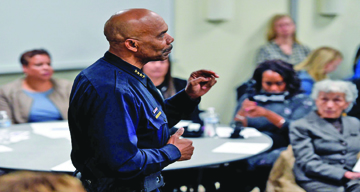by Glen Richardson
 Denver Police have not implemented any recommendations from a 2016 audit meant to help officers avoid racial bias in patrol duties, a follow-up report in September 2017 finds. Denver Auditor Timothy M. O’Brien, CPA, made his original recommendations in a January 2016 audit of police operations, including updates to biased policing policies and demographic data collection.
Denver Police have not implemented any recommendations from a 2016 audit meant to help officers avoid racial bias in patrol duties, a follow-up report in September 2017 finds. Denver Auditor Timothy M. O’Brien, CPA, made his original recommendations in a January 2016 audit of police operations, including updates to biased policing policies and demographic data collection.
“It’s important for Denver Police policies to protect and serve all people equally,” explains Auditor O’Brien. “There is no way to tell if officers are stopping people without bias regarding race, gender or age if officers choose not to document demographic data.”
According to the American Civil Liberties Union (ACLU): Racial profiling refers to the practice by law enforcement officials of targeting individuals for suspicion of crime based on the individual’s race, ethnicity, religion or national origin. Criminal profiling, generally, as practiced by police, is the reliance on a group of characteristics they believe to be associated with crime. Examples of racial profiling are the use of race to determine which drivers to stop for minor traffic violations or the use of race to determine which pedestrians to search for illegal contraband.
the use of race to determine which pedestrians to search for illegal contraband.
Secret House Surveys
The previously agreed-upon recommendation involved communicating with the U.S. Department of Justice’s Office of Community Oriented Policing Services for options on how to utilize the Community Policing Self-Assessment Tool (CP-SAT). This tool could help officers evaluate the effectiveness of community policing efforts over time. Instead, Denver Police said it conducted other surveys to get input from staff. The Denver Police Foundation also conducted an independent community survey. Auditors were unable to see these survey results or the contents of the survey. Denver Police shared no information regarding the independent survey, which the Denver Police Protective Association (PPA) keeps for internal purposes.
“We cannot assess whether either survey met the spirit of or captured content similar to the CP-SAT survey,” the follow-up report says. “As a result, we consider this recommendation as having not been implemented,” the report concludes.
Other recommendations the department previously disagreed with included updating its Biased-Policing Policy to include an annual assessment of collected demographic data, and requiring officers to collect data for all pedestrian and traffic self-initiated contact. Currently, officers only collect this data for encounters that lead to a citation, arrest or street check.
Double Standard?
Within weeks following the auditor’s report, an overwhelming majority of Denver police officers say they have no confidence in the ability of Chief Robert White to lead the department. In a news conference on Oct. 24 Denver Police Protective As sn. President Nick Rogers announced than a survey of 582 union members yielded a 94 percent “no confidence” vote.
sn. President Nick Rogers announced than a survey of 582 union members yielded a 94 percent “no confidence” vote.
The vote, according to PPA, reflects a perception by the rank and file officers that there exists a lack of transparency within the police administration and a double standard applies to conduct of high-ranking members of the police administration,” Rogers told the conference.
When asked if the union had ever issued a “no confidence” vote before. Rogers replied, “Never.”
PR Policing Policy
The police department has long touted its community-oriented policing philosophy. Denver Police first incorporated community policing into its operations in the 1980s. However, without demographic data from police encounters there is no way to ensure community-policing efforts are effective or equitable. The department says it has communicated with stakeholders, including community leaders, about ways to collect more information. However, there is no plan in place at this time for collecting personal data from individuals about interactions with police.
The Department of Public Safety has not implemented any of the recommendations made in the Police Operations — District Patrol audit report. Accordingly, Auditor O’Brien has determined that the risk associated with the audit team’s initial findings has not been mitigated.
Auditor Timothy M. O’Brien, CPA, has more than 40 years of auditing and accounting experience and strives to bring greater clarity, transparency and accountability to Denver’s city government for its residents. Elected in 2015, he is distinguished from his predecessors by being an actual professional auditor. He is a licensed Certified Professional Accountant and holds the designations of Chartered Financial Analyst and Chartered Global Management Accountant.
